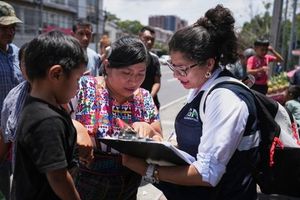The alarming resurgence of measles outbreaks has become apparent both in Canada and Morocco, raising widespread public health concerns. These simultaneous outbreaks underline the extensive impact of vaccination hesitancy and misinformation, which continue to threaten immunity among populations.
Recently, the Middlesex-London Health Unit reported multiple exposures to confirmed measles cases at local hospitals. Both the Strathroy Middlesex General Hospital and London Children's Hospital experienced these alarming incidents, prompting health officials to advise individuals to check their immunization status.
Specifically, exposures were reported at the Strathroy emergency department on January 19 and 23, and London's Children's Hospital pediatric emergency department on January 24, 25, and 28. Despite these exposures, health authorities confirmed no cases within Middlesex County as of yet.
Dr. Joanne Kearon, associate medical officer of health for the Middlesex-London Health Unit, stated, "If someone has been exposed and is immunocompromised, not immune, or was accompanied by an unvaccinated infant, we'd ask they call us at MLHU so we can assess whether they're eligible for post-exposure treatment." Amid these local concerns, provincial health officials reported 26 confirmed and 27 probable measles cases in Ontario since October, mainly affecting children and highlighting the risk to vulnerable populations, such as infants.
Comparatively, Morocco is dealing with its own severe measles outbreak, which has escalated to tragic levels. After initially achieving near-eradication of the virus, the North African nation now faces overwhelming numbers of infected individuals, with 25,000 cases confirmed and 120 deaths recorded as of recent reports. The local term for measles, "Bouhamron," has become synonymous with the chaotic spread of the disease through schools, prisons, and crowded communities.
The Moroccan government has responded with urgent vaccination campaigns, but the resurgence of the virus has largely been attributed to plummeting vaccine coverage rates and widespread anti-vaccine conspiracies linked to misinformation, particularly during the COVID-19 pandemic. One spokesperson from the Health Ministry described the current epidemic as alarming: "We had reached the elimination stage. That meant fewer than one case per million people annually. But now, we've gone back to the control phase." This highlights the fragile state of public health when immunization rates fall.
Experts stress the dire need for vaccination to combat the outbreak, with one health policy researcher, Tayeb Hamdi, warning about the risks associated with measles. He noted, "This is a dangerous disease with serious, lifelong complications... blindness, brain inflammation—these are not minor risks." Without adequate vaccination coverage, measles can spread rapidly through communities, particularly where misinformation proliferates. Tragically, regions with vaccination rates below the 95 percent threshold have seen the virus regain stronghold.
To prevent severe consequences, health authorities recommend two doses of the measles vaccine, emphasizing the importance of early immunization at nine months of age and again shortly after. This dual emphasis on vaccination mirrors the directives issued by health units across Canada—a proactive stance to avert escalated risks.
Despite condemnations of anti-vaccine narratives, some parents continue to eschew vaccinations. According to Moroccan researchers, many think measles is no longer a threat due to prior gains, foregoing vaccinations for their children. "Some parents have simply neglected to get their children vaccinated, thinking measles is a thing of the past. Others refuse vaccines outright, believing they are dangerous," explained another health policy analyst.
The health system in Morocco, already strained from post-pandemic recovery, is now inundated with feverish patients and significant hospitalization needs resulting from measles complications. Such complications reportedly occur in about 10 percent of cases.
Back in Canada, public health experts have voiced similar concerns about vaccination hesitancy contributing to rising cases, with Ontario’s health data indicating only six patients were previously vaccinated out of fifty-three cases reported earlier this year. There’s even been heightened concern after two local health units declared measles outbreaks with up to 19 patients being affected.
The resurgence of such viral outbreaks, whether on the streets of Southern Ontario or within Moroccan communities, clearly points to the delicate balance required to maintain herd immunity. Both regions are actively working to recalibrate their vaccination strategies to mitigate risks and prevent future occurrences.
To tackle the growing angst surrounding vaccinations, Moroccan health authorities have launched targeted public campaigns to reach unvaccinated children and their families, stressing the necessity of relying upon scientific facts versus misinformation. This echoes similar initiatives being observed within the Canadian health framework, as provincial health officials contact individuals potentially exposed to the virus.
Hamdi poignantly summarizes the existing situation, arguing, "The only way out of this is vaccination. If we don't act now, we'll be dealing with outbreaks like this again and again." This sentiment emphasizes the collective responsibility societies hold to combat misinformation, prioritize vaccination, and protect their communities.
Both Canada and Morocco’s recent experiences elucidate the broader ramifications of reduced vaccination compliance and public mistrust. It challenges health systems globally, and highlights the importance of clear, reliable information promoting public health initiatives. The outcomes of these dual outbreaks will likely shape health policy discussions for years to come.



